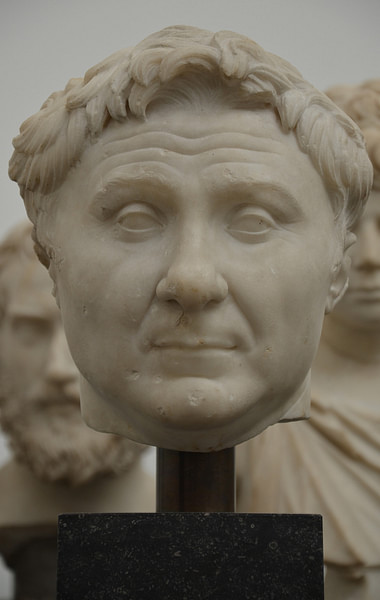
Ptolemy XII Neos Dionysos (r. 80-51 BCE) was king of Ptolemaic Egypt and father of Cleopatra VII (r. 51-30 BCE). His illegitimate birth and drunkenness inspired ridicule, and he was nicknamed "Auletes" ("the Flute-Player") for his musicianship. He reigned for nearly 30 years, bribing leaders of the Roman Republic like Pompey and Julius Caesar to prevent the Roman annexation of Egypt.
In 58 BCE, amidst a surge of economic turmoil and anti-Roman sentiment, his throne was usurped by his daughter Berenike IV. Ptolemy XII bribed the Roman proconsul Aulus Gabinius to restore him in 56 BCE. These increasingly large bribes forced him to borrow money from Roman bankers, and his children Cleopatra VII and Ptolemy XIII inherited crippling debts. However, his actions also ensured the continuation of the Ptolemaic dynasty by safeguarding Egypt from Roman warfare.
Early Life
Ptolemy XII was a member of the Greek Ptolemaic dynasty, which ruled Ptolemaic Egypt after Alexander the Great's conquest. Ptolemy XII was born at an unknown date, probably after 100 BCE based on the Roman contemporary Cicero's description of him as a teenager in 80 BCE. He was the illegitimate son of Ptolemy IX and an anonymous mother. Modern historians have speculated that his mother may have been a Greek or Syrian courtesan or an Egyptian aristocrat. Children born out of wedlock were viewed with contempt in Ptolemaic Egypt, and he was called "Nothos" ("the Bastard" in Greek).
In 88 BCE, Ptolemy IX's rival and half-brother Ptolemy X Alexander died while trying to take over Cyprus. Before dying, Ptolemy X allegedly bequeathed Egypt to the Roman Republic in his will. Rome ignored this bequest because Ptolemy IX was in control of the kingdom. Additionally, the Roman Senate feared that whichever general conquered Egypt would be rich and popular enough to become a tyrant. The threat of Roman annexation was constant throughout Ptolemy XII's life.
Ptolemy XII spent his adolescence in Syria for unknown reasons. Mithridates VI of Pontus (r. 120-63 BCE) may have taken him captive when he conquered the Egyptian-controlled island of Kos in 88 BCE. Some modern historians have theorized that he was actually one of Cleopatra III and Ptolemy VIII's sons, who were sent to Kos before 113 BCE. However, these princes were legitimate and much older than Ptolemy XII.
Coronation & Marriages
After Ptolemy XI was killed by a mob uprising in Alexandria, rumors spread that his will bequeathed the Ptolemaic Kingdom to Rome. To prevent Rome from annexing Egypt, the Alexandrians rushed to replace him with a new king. Generations of civil war had killed most of the Ptolemaic dynasty, so Ptolemy XII was chosen to rule Egypt, while his brother Ptolemy was given Cyprus. The Seleucid queen Cleopatra Selene I, who had Ptolemaic ancestry, argued that her sons had a better claim to the throne. Selene and her sons visited Rome in 75 BCE and donated a magnificent candelabra to the Temple of Jupiter Capitolinus, but the Roman Senate did not acknowledge their claims.

In 79 BCE, Ptolemy XII married the Ptolemaic princess Cleopatra V Tryphaena to secure his claim to the throne. Ancient Egyptian inscriptions describe Ptolemy XII and Cleopatra V as "Sibling Gods", but this was a formulaic title used for all Ptolemaic ruling pairs. Cleopatra V was probably the daughter of Ptolemy X and Cleopatra IV, making her Ptolemy XII's cousin. The couple had at least one legitimate daughter, Berenike IV. His most famous child, Cleopatra VII, may have been born from this marriage, despite the Roman historian Strabo's claim that she was illegitimate.
In 69 or 68 BCE, Cleopatra V disappeared from official inscriptions either because he divorced her or she died. He subsequently had a daughter named Arsinoe IV and two sons, Ptolemy XIII (r. 51-47 BCE) and Ptolemy XIV (r. 47-43 BCE), with an unknown woman. Historians have speculated that this woman was a Greek aristocrat, a courtesan, or an Egyptian priestess. At some point in his life, he appears to have been betrothed to Mithridatis, daughter of Mithridates VI of Pontus. An inscription from the Temple of Isis in Philae also identifies three male dancers – Tryphon, Nicolaus, and Strouthion – as his lovers.
Kingship & Reputation
Ptolemy XII had an infamous reputation for drunkenness and frivolity. He often hosted and performed in musical competitions, which was considered low-class. His favorite instrument was the aulos, and he was mockingly nicknamed "Auletes" ("the Flute-Player"). Both his drinking and his musical interests were associated with the mystery cult of Dionysus, the god of wine, music and divine inspiration. Ptolemy XII gave himself the epithet "Neos Dionysos" ("New Dionysus") and was depicted with the god's attributes. The Ptolemaic dynasty had always revered Dionysus, who conquered Asia in Greek mythology and was considered the Greek counterpart to the Egyptian god Osiris.
Ancient writers described Ptolemy XII as lazy and unworthy to be king, but he made many achievements in his reign. He forged a strong relationship with the Egyptian priesthoods, building many new temples and renovating old ones. He often visited the holy city of Memphis to pay homage to the Temple of Ptah there. Additionally, trade flourished, enriching Ptolemaic Egypt.

His reign ushered in a renaissance for the Library of Alexandria, which had declined after Ptolemy VIII (r. 170-116 BCE) persecuted scholars. Many major intellectuals flourished under Ptolemy XII's patronage, including the physicians Zopyrus and Apollonius of Kition, the philosophers Antiochus of Ashkelon and Arieus Didymus, and Timagenes of Alexandria, the most influential historian of his generation. Timagenes' pupils Strabo and Nicolaus of Damascus wrote authoritative historical accounts relied upon by modern historians. New schools of philosophy were also founded, which heavily influenced Roman philosophy.
Relationship with the Roman Republic
The Ptolemaic army was no longer a world power by the 1st century BCE, and Egypt relied on Roman protection from the Seleucid Empire. The Roman politicians Marcus Licinius Crassus (115-53 BCE) and Julius Caesar (100-44 BCE) proposed the annexation of Egypt in 65 BCE. This was opposed by senators like Marcus Tullius Cicero, who feared that it would jeopardize the republic.
Ptolemy XII used bribes and diplomacy to create a network of allies in the Roman Senate who could block annexation attempts. He also wanted official confirmation that Rome recognized him as Egypt's rightful king. His most important ally was Pompey the Great (106-48 BCE), whom he invited to Alexandria in 67 BCE, and the following year, he sent 8,000 Egyptian soldiers along with supplies to support Pompey's war against Mithridates VI. In 59 BCE, Pompey and Caesar passed a law declaring Egypt a friend and ally of the Roman Republic, after Ptolemy XII paid them a bribe of 6,000 talents, equivalent to Egypt's annual revenue.

To pay for these bribes, Ptolemy XII borrowed large sums of money from Roman creditors, developing a reputation as a beggar and swindler. He raised taxes in Egypt to help pay off his debts which caused worker strikes and civil resistance. Anti-Roman sentiments dramatically increased in Alexandria during his reign, resulting in the lynching of a visiting Roman in 60 BCE.
In 58 BCE, Clodius Pulcher proposed the annexation of the agriculturally rich Cyprus to fund the distribution of state-subsidized grain to the Roman populace. As a pretext for war, he accused Ptolemy of Cyprus of cooperating with pirates in the ancient Mediterranean. Cato the Younger (955-46 BCE) was given command of the Cyprus campaign because of his loyalty to the Republic and because Clodius wanted to remove him from Rome. Cato offered to allow the king to abdicate his throne and seek refuge at the Temple of Aphrodite in Paphos. Ptolemy of Cyprus committed suicide instead, and Cato annexed the island.
Usurpation
Ptolemy XII did nothing to prevent the death of his brother and the loss of Cyprus, making him appear weak to his subjects. That year, he was forced into exile and his daughter Berenike IV became queen. She briefly co-ruled with a woman named Cleopatra VI Tryphaena, whom the historian Porphyry described as her sister. However, it is possible that she was Ptolemy XII's wife of the same name.
Ptolemy XII fled to Rhodes with his teenage daughter Cleopatra VII, where they were welcomed by Cato. According to Plutarch, Cato warned Ptolemy XII to return to Egypt instead of putting his trust in the corrupt politicians of Rome. Despite this warning, he proceeded to Rome and lived as a guest in Pompey's villa.

The Alexandrians sent an embassy of 100 citizens to convince the Romans not to help Ptolemy XII, but he stopped the ambassadors through a combination of bribes, intimidation and assassinations. Many powerful Romans wanted Ptolemy XII to regain control of Egypt so that he could pay back the money he had borrowed from them. Opponents to the idea of Roman intervention successfully argued that prophecies and omens had foretold doom if Rome reinstated an Egyptian king. Denied any help, Ptolemy XII sought sanctuary in the Temple of Artemis at Ephesus in 57 BCE.
Gabinius overcame the Alexandrians and restored Ptolemy to power, but was himself banished by the Senate for invading Egypt without their authority, and undertaking a war considered ill-omened by the Romans; for it was forbidden by the Sibylline books.
(Appian, Spanish Wars, 8.51, trans. Horace White)
In 56 BCE, Pompey instructed Aulus Gabinius, the Roman proconsul of Syria, to help Ptolemy XII despite the Senate's opposition. Ptolemy XII promised to pay Gabinius and his army in exchange. Gabinius led his army into Egypt, leaving Syria vulnerable to piracy and banditry. This was the first time that a Roman army had ever occupied Egypt. He and his lieutenant Mark Antony (83-30 BCE) quickly defeated Berenike IV and restored his throne. Later in life, Antony became the ally and husband of Cleopatra VII. After the war, Gabinius was put on trial for defying the Senate to help Ptolemy XII. He was acquitted of treason thanks to Pompey's influence but was convicted of extortion and exiled in 54 BCE.
Later Reign
Back in power, Ptolemy XII executed Berenike IV and important citizens who had supported her, confiscating their money and property. He suppressed rebellions using the Gabiniani, a mercenary force of 2,500 Roman soldiers left behind by Gabinius. This army was reinforced with conscripted slaves, criminals, and mercenaries from other parts of the Roman Republic. Their fierce reputation impressed even Caesar when he invaded Egypt in 48 BCE.
The bribes paid to ensure his restoration had multiplied his debt, and he raised taxes again. One of his first acts was to appoint the Roman banker Gaius Rabirius Postumus as the new finance minister of Egypt. Rabirius' primary concern was regaining the money that he and other Romans had given Ptolemy XII, and he extorted taxpayers through predatory fiscal reforms. The economy of Ptolemaic Egypt suffered as the silver content of coins was reduced. Eventually, the Alexandrian citizens attacked Rabirius in protest. Ptolemy XII took Rabirius into protective custody and sent him home before he was killed. Rabirius was put on trial in Rome for extortion, and Caesar took ownership of the remaining debts, intending to eventually collect them from the Egyptians.
In 52 BCE, Ptolemy XII named Cleopatra VII his co-regent and made preparations for her to rule after him. In his will, he left his kingdom to his oldest surviving children: the 18-year-old Cleopatra VII and 10-year-old Ptolemy XIII. He sent a copy of his will to Rome to be stored in the treasury, hoping the Roman Senate would enforce it in the event of a succession dispute. Pompey seized the will before it reached the treasury so that he could have power over the heirs by acting as executor of the will.

Death & Legacy
Ptolemy XII died of natural causes in the spring of 51 BCE, when he was in his 40s. Though he wished for his children to rule together peacefully, they fought for sole control of Egypt. In 48 BCE, Caesar defeated Pompey in a civil war, and Pompey fled to Egypt where he was executed by Ptolemy XIII. Caesar arrived in Egypt soon after intending to collect Ptolemy XII's debts. He intervened in the Egyptian succession crisis by helping Cleopatra VII defeat and kill Ptolemy XIII in 47 BCE. During this conflict, Caesar and Cleopatra became lovers, resulting in the birth of Caesarion, Ptolemy XII's first grandchild.
Throughout his long-lasting reign the principal aim of Ptolemy Auletes was to secure his hold on the Egyptian throne so as to eventually pass it to his heirs. To achieve this goal he was prepared to sacrifice much: the loss of rich Ptolemaic lands, most of his wealth and even, according to Cicero, the very dignity on which the mystique of kingship rested when he appeared before the Roman people as a mere supplicant. (Siani-Davies, p. 340)
Cleopatra VII continued her father's pro-Roman policies to ensure Egypt's continued independence. She is remembered as a more competent and intelligent ruler than him in Roman literature, but modern historians have since reassessed his reign. Despite his occasional brutality and harsh economic policies, he ultimately succeeded in protecting Egypt and building considerable wealth. His plans to ensure a peaceful transition of power after his death failed for reasons out of his control.






